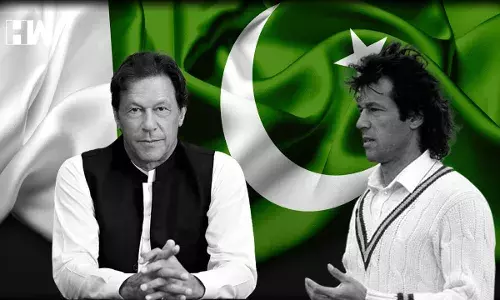Imran Khan became the Prime Minister of Pakistan in 2018 – an ascension widely believed to be backed by the Pakistani Army. He was the 22nd PM of Pakistan. His term has been full of allegations of corruption, with the opposition moving a no-confidence motion which is likely to dethrone him from his PM’s chair. The opposition has accused him of economic mismanagement.
Before entering into politics, Khan was an established and well-known Cricketer. In 1971, at Edgbaston, Khan made his Test cricket debut. His first match was against England. In 1976, he secured a permanent place in the national team. In the late 1970s, Khan was one of the pioneers of the reverse swing bowling technique. He also has the second-highest all-time batting average of 61.86 for a Test batsman playing at position 6 in the batting order.
In 1982, Khan took over the team’s charge as captain and served as captain till his retirement. He played his last Test match for Pakistan in January 1992, against Sri Lanka at Faisalabad. In his career, he has a record of playing 88 Test matches,126 innings, and scored 3807 runs at an average of 37.69, including six centuries and 18 fifties.
Speaking of his political career, on April 25, 1996, he founded Pakistan Tehreek-e-Insaf (PTI). In 1997, he fought for the seat of National Assembly of Pakistan. He fought the 1997 Pakistan General Elections from two constituencies – Mianwali and Lahore. But unlike cricket, in politics, his journey seems to be full of facing downfalls and struggles. He lost elections from both the constituencies.
In October 2002, he again fought Pakistan General Elections and was prepared to form an alliance if his party did not get a majority of votes. He was elected from Mianwali.
On 30 October 2011, Khan addressed more than 100,000 supporters in Lahore. He challenged the policies of the ruling government. In 2011, in Karachi, another successful gathering was held, and thousands showed up at the gathering. Since then, he has become a real threat to the ruling parties in Pakistan. Between 2011 and 2013, a political rivalry sparked up between Khan and Nawaz Sharif.
During his struggling days, when he was unable to beat Pakistan Muslim League-Nawaz (PML-N) and Pakistan Peoples Party (PPP) – the two main political parties that have been repeatedly in power when the military was not ruling the country, he said that in Pakistan, politics is hereditary. He made such remarks referring to the leaders of PML-N and PPP parties which are led by the Sharif family and the Bhutto family respectively.
In 2002, Khan became a Member of Parliament. In 2013, he was again elected to the National Assembly.
A year after elections were concluded, in 2014 Khan claimed that the elections were furnished in favor of the ruling PML-N led by then prime minister Nawaz Sharif. In August same year, Khan led a rally of his supporters from Lahore to Islamabad and demanded the resignation of Sharif. He had also demanded a probe for electoral fraud.
In 2018, Khan’s party came to power. During the 2018 elections, he had promised to crackdown on corruption, enact anti-poverty programmes, improve healthcare and education and turn his country into an Islamic welfare state, or what he referred to as Naya Pakistan (New Pakistan).
When Khan was in power, he spoke about making Pakistan an Islamic welfare state. However, he failed to fix the economy and the basic problem of keeping the prices of commodities in control.
Speaking of foreign policy front, he had cold relations with the West, especially the US. He had built good relations with Russia and China.
During Imran Khan’s tenure, ties between India and Pakistan were strained. In 2019, Pakistan-based terror group killed 40 CRPF personnel in a suicide attack in February. This led India to forcefully attack the terror camps in Balakot in Khyber Pakhtunkhwa. The next day, an intense fight took place between both the air powers and due to the fight, Indian Air Force Wing Commander Abhinandan Varthaman was captured and later released by Pakistan.
The relations became worse when India made an announcement of withdrawing the special powers of Jammu and Kashmir and bifurcation of the state into two union territories in August 2019. Khan, who insists that the Kashmir dispute remained a big issue between the two countries, raised the issue on multiple forums including the United Nations during his tenure.
Later in 2019, Prime Minister Khan formally inaugurated the Kartarpur Corridor, paving the way for Indian Sikh pilgrims to visit one of their religion’s holiest sites in Pakistan without needing a visa.
On February 22, 2022, Khan said that he would like to have a TV debate with his Indian counterpart and Indian Prime Minister Narendra Modi to resolve differences between the two neighboring countries.
Khan is from Lahore, his paternal family are of Pashtun ethnicity and belongs to the Niazi tribe. Khan belonged to an upper-middle-class family. He was brought up along with his four sisters. He studied at Royal Grammar School Worcester in England, where he excelled at cricket. He enrolled in Keble College, Oxford in 1972 where he studied Philosophy, Politics, and Economics, graduating in 1975.
As an independent media platform, we do not take advertisements from governments and corporate houses. It is you, our readers, who have supported us on our journey to do honest and unbiased journalism. Please contribute, so that we can continue to do the same in future.

